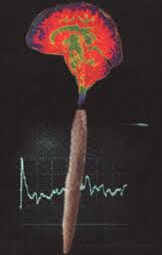Marijuana is one of the most commonly used recreational drugs. It is a dried, shredded brown and green mix of seeds, stems, flowers, and leaves derived from the Cannabis sativa plant. How does marijuana affect your brain? The main mind-altering chemical responsible for most of the intoxicating effect of marijuana is delta-9-tetrahydro-cannabinol (THC). Marijuana is typically smoked, rolled up as a cigarette, or put into a pipe. It can also be brewed as a tea, or mixed with food.
How Does Marijuana Affect the Brain?
Short Term Effects
After inhaling marijuana smoke into your lungs, it doesn’t take long for THC to enter the bloodstream. From there, it is quickly transported the rest of the body’s organs and the brain. With eating or drinking marijuana, the absorption speed of THC is slower. In that case, the user generally feels the effects within half an hour to an hour.
There are several different places in the brain that have concentrated groups of cannabinoid receptors, and these receptors are activated by a neurotransmitter called anandamide. However, anandamide is a cannabinoid that your body makes and regulates naturally. Marijuana mimics the actions of anandamide by activating neurons, which causes short term effects on the brain. THC also  triggers your brain into releasing large amounts of dopamine, a neurotransmitter that helps control the brain's reward and pleasure centers. How does marijuana affect the brain, and what can a user expect?
triggers your brain into releasing large amounts of dopamine, a neurotransmitter that helps control the brain's reward and pleasure centers. How does marijuana affect the brain, and what can a user expect?
- In the hippocampus:The hippocampus sits within the temporal lobe and is important for short-term memory. THC changes the way you process information, so your judgment may be impaired.
- In the cerebellum: The cerebellum at the back of the brain is responsible for coordination and regulation of muscular activity. THC interferes with this process and slows down reaction time.
- In the basal ganglia:The basal ganglia at the base of the brain directs unconscious muscle movements, which is why motor coordination is impaired when using marijuana.
Other effects of marijuana include alteration of senses and perceiving of time, mood changes, difficulties in thinking and solving problems.
Long Term Effects
Studies have shown that marijuana affects brain development. When marijuana users begin using as adolescents, the drug may reduce their thinking, memory, and learning functions later in life. The long term effects of marijuana are most evident on teenagers as their brains are still busy building new connections and maturing.
One study shows that for people who started using marijuana heavily at a young age, their IQ drops by 8 points on average between the ages of 13-38. Even after quite using in adult years, their lost mental abilities do not return fully. In contrast, those who started using marijuana after becoming adults do not exhibit such drastic decline in IQ points.
For a detailed explanation of how marijuana works on your brain, please watch:
Marijuana and Mental Health Problems
Now that you are aware of how does marijuana affect the brain, it should also be pointed out that the drug is also linked to mental disorders. Many studies show a connection between chronic marijuana use and increased rates of depression, anxiety, and schizophrenia. These studies also suggest that the age when marijuana is first used is a factor for vulnerabilities to these mental health problems later on in life. What is still not well known is whether marijuana use causes these mental conditions, makes them worse, or if the user who already has a mental health condition is using marijuana as self-medication. However, what is clear is that chronic marijuana use can be a marker of risk for addiction and mental illnesses. This is especially true in young people, stemming from environmental or genetic vulnerabilities, such as violence or stress. Moreover, chronic marijuana use may trigger an acute psychotic reaction in individuals who are at risk for mental health problems.
Is Marijuana Addictive?
Yes, marijuana may be addictive, as in a person cannot stop using marijuana even though it has interfered with many aspects of their life. Over-stimulation of the endogenous cannabinoid receptors with TCH can cause changes in the brain that lead to addiction. Some studies estimate that 9% of people who use marijuana will become addicted to it. The chances of becoming dependant on TCH in marijuana increase if you're a daily user, or if you start using marijuana at a young age. More importantly, medical experts agree that marijuana dependence increases to 17% when people begin using the drug in their teens, among which dependency increases up to 25-50% with daily users.
Marijuana addiction is also linked to withdrawal symptoms. Frequent marijuana users who quit using the drug often reported mood problems, sleeping difficulties, irritability, cravings, restlessness, decreased appetite, and other various forms of physical discomfort, peaking within the first week and may last up to 2 weeks after quitting.
